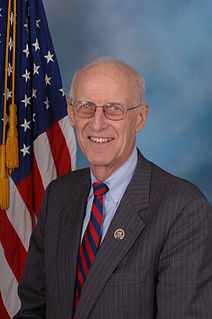A Quote by Michael Scheuer
I think what history will show is that one of the most tragic results of the war in Iraq will be that although Sharon, the Likudites, the Neoconservatives in our country, President Bush and the Democratic party thought the war in Iraq and destroying Saddam would benefit Israeli security, we're seeing absolutely that the war in Iraq has probably put Israeli security in a more tenuous condition than it's been in since the founding of the Israeli state.
Quote Topics
Related Quotes
There has been a good deal of comment — some of it quite outlandish — about what our postwar requirements might be in Iraq. Some of the higher end predictions we have been hearing recently, such as the notion that it will take several hundred thousand U.S. troops to provide stability in post- Iraq, are wildly off the mark. It is hard to conceive that it would take more forces to provide stability in post-Saddam Iraq than it would take to conduct the war itself and to secure the surrender of Saddam's security forces and his army — hard to imagine.
In my head, thought, I would love to do an interview where it's just sort of de-constructed - the talking points of Iraq - sort of the idea of, is this really the conversation we're having about this war? That if we don't defeat Al Qaeda in Iraq, they'll follow us home? That to support the troops means not to question that the surge could work. That, what we're really seeing in Iraq is not a terrible war, but in fact, just the media's portrayal of it.
I think the Americans are dying to leave Iraq. I was against the war but longed for the fall of Saddam; the decision to go to war clearly was taken long before the matter reached the U.N., given its inevitability. I kept my fingers crossed for the emergence of democracy in Iraq even if that would mean victory for a man whose politics I have little sympathy with.
The difference between the Bush I war against Iraq and the Bush II war against Iraq is that in the first one, we appealed to the sentiments and interests of the different groupings in the region and had them with us. In the second one, we did it on our own, on the basis of false premises, with extremely brutality and lack of political skill.
I opposed the war in Iraq because I did not believe it was in our national security interest, and I still don't. What we [America] did was akin to taking a baseball bat to a beehive. Our primary security threat right now is terrorism - and by doing what we did in Iraq, we've managed to alienate a good part of the world and most of the allies whose intelligence and other help we need to combat and defeat terrorism.
The war against Iraq is as disastrous as it is unnecessary; perhaps in terms of its wisdom, purpose and motives, the worst war in American history... Our military men and women...were not called to defend America but rather to attack Iraq. They were not called to die for, but rather to kill for, their country. What more unpatriotic thing could we have asked of our sons and daughters...?



































